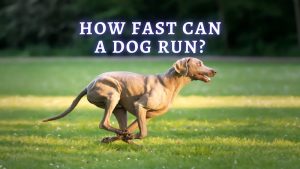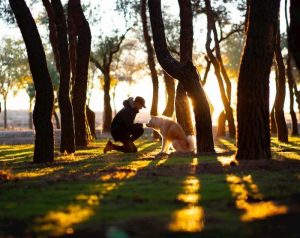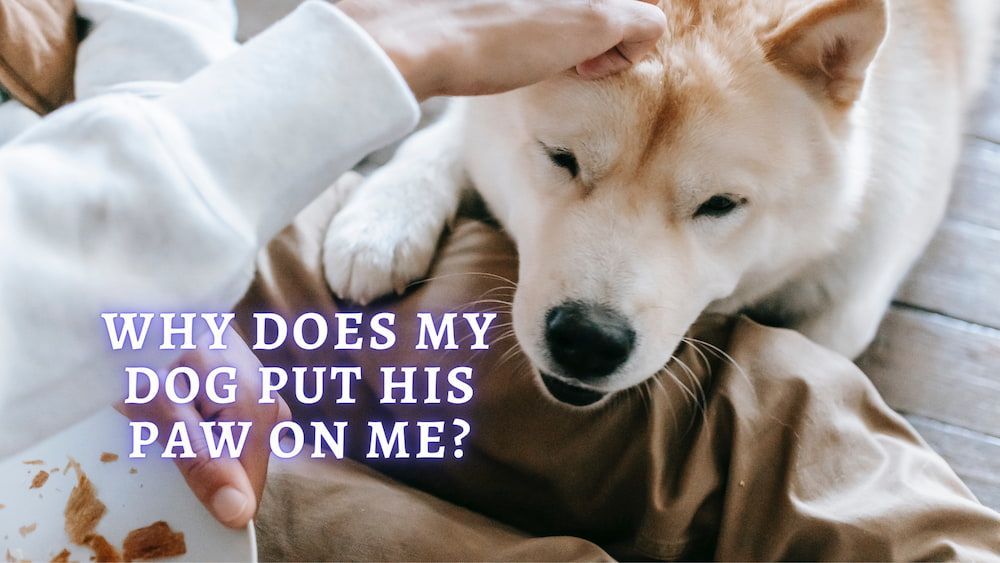
People who have a dog can tell you: our canines are more than just pets. Since we bring home a fur baby that is a fluffy bundle of joy, they become part of our families. According to Pet Pedia statistics, 95.5% of dog parents see their pups as family members. In fact, the US statistics confirm that most of them talk to their dogs as regular human beings.[1]
Dogs can’t communicate through words as humans do. So, your pup has to use different ways to say what he wants. Your dog communicates volumes of information using his versions of sign and body language. Your furry friend may growl or bark to grab your attention. He can also get physical. Have you ever been reading a book in a cozy armchair and suddenly feel that warm and fluffy touch of your dog’s paw? It is the easiest way for pups to get your attention.[2]
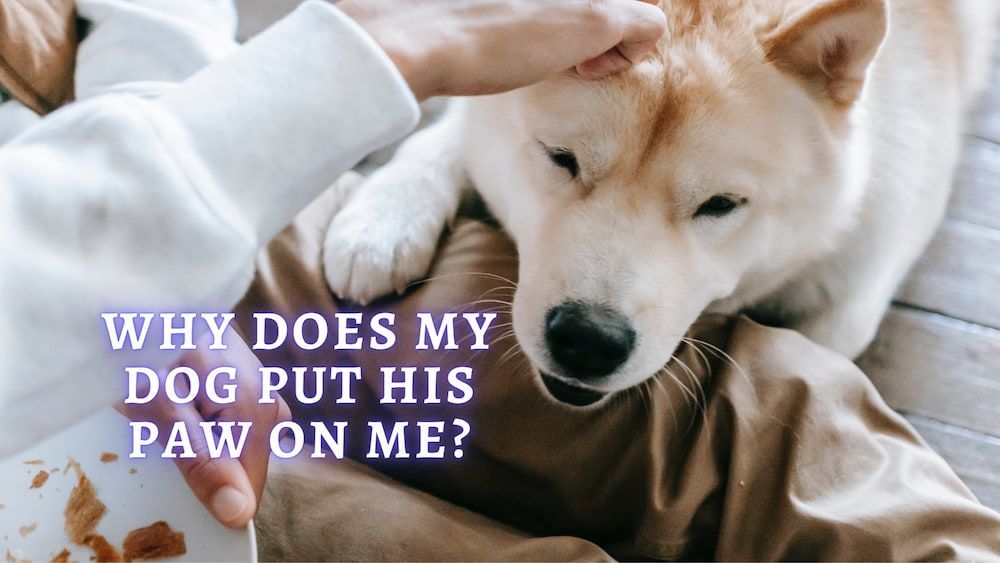

Image by Zen Chung from Pexels
Dog parents also communicate with their canine companions without using words. Chances are, you stroke them with your hands. Even if you scold your pup for bad things, you may point your finger at him or wave your hands to make him stop doing something.
Most dogs mean well when putting their paws on you. But what exactly are they trying to tell you? In this article, we will discuss some of the more common reasons why your pet does it.
RELATED ARTICLE: Why Does My Dog Sit On Me?
Pawing is a Form of Communication
Pawing is one of the most significant tools your canine companion uses to communicate with you. Or, to be more precise, your dog tries to initiate communication, akin to your patting your friend on the shoulder to attract his attention or clearing your throat to show that you want to say something. But your dog can do it just as easily with barking. So, when he decides to rest his paw on you to grab your attention, he makes a choice. It begs the question: Why?
1. Seeking of Attention
Dogs thrive on human attention and love. We have raised them to be dependent on us for everything, including entertainment and social interaction. So they may paw us to let us know they feel abandoned and as a way to persuade us into giving them extra love. For instance, your fur child can paw you when you are busy most of the day. In such a way, he asks for attention and gently reminds you: “Hey look at me, I need your attention too!”
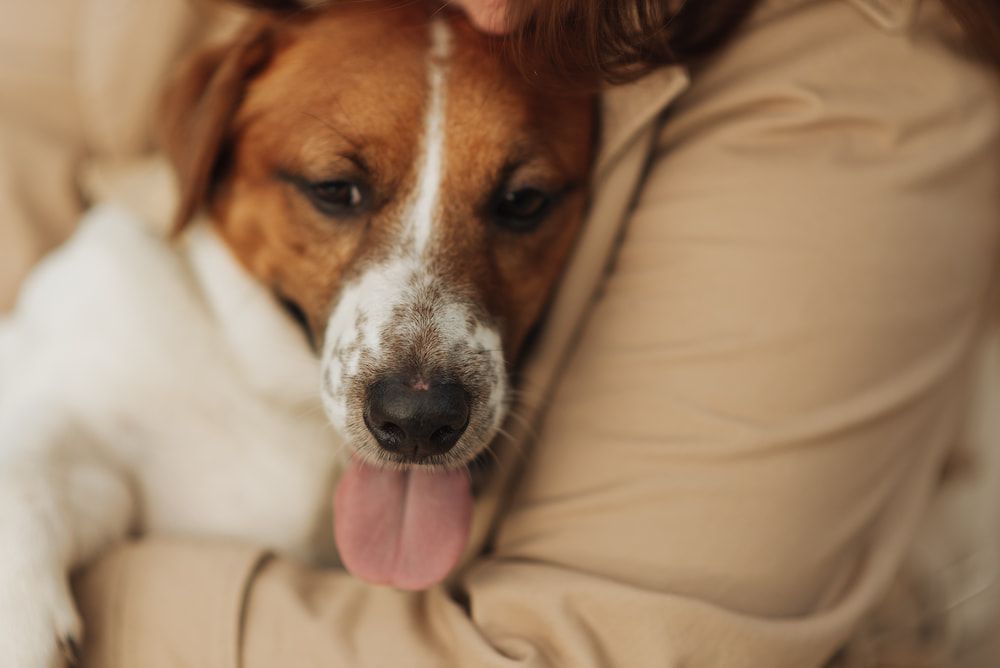

Image by @smiromvmir from Freepik
2. Asking for Food
When it is getting close to dinner time, your pooch pal may feel the need to remind you of his hunger. Since your dog cannot use words to tell you how hungry he is, he has to get creative and hope you understand what he wants to say. Your canine companion can paw you when he is ready to eat, or he can nudge his food bowl.
Dog parents are always amazed at how their fluffy friends can tell the time! Check your watch the next time your dog rests his paw on you. And you will see that dogs have a great internal clock and seem to remember what time their dinner is.
While this mealtime reminder may seem harmless, try not to turn your fur child into a food demanding monster. Some canines have perfected the art of begging for their favorite treats by resting their paws on their owners. So make sure you don’t react to constant pawing if you know that your pet asks for food in such a way. If you let your dog decide when to feed him, he can gain excess weight, which can affect his health negatively. If your pooch pal uses demanding tactics when he craves a treat, it might be high time to think about a new snacking routine.
3. Asking to Play
A pup who wants to start playing will often try several tactics to engage you in playtime. He may wag his tails, bounce away from you in a play bow, or rest his paw on you in an attempt to grab your attention. Canines often start playing by pawing towards the play recipient. They do this with their human companions, other dogs, and even with felines, birds, and other pets. Though this is an assertive way of involving you in a game, it is often successful.
If your fur child comes up to you with a toy in his hand, touching your leg, what is the likelihood that you will start playing with your four-legged friend? He knows this is a great way to get your attention and play with you.
4. Feeling Anxious
Pawing can also mean that your pup is trying to tell you that he is worried or something is wrong. If he puts his paw on you and is not hungry or in a playful mood, especially if he is breathing heavily or holding his tail low, you can be relatively confident that your fur child is expressing concern.
Canines with thunderstorm anxiety may become overwhelmed with fear and begin pawing their human companions long before a thunderstorm strikes.
Many dogs are afraid of loud, sudden, unpredictable noises, not just thunderstorms. If a dog is noise-sensitive, these noises will likely be frightening to him. Dogs who are fearful of thunderstorms look for signs like low barometric pressure, strong wind, and rain clouds.[3]
Says Alison Seward, Veterinary Assistant at Ryan Veterinary Hospital of the University of Pennsylvania.
If your pup is experiencing separation anxiety, he may paw you when it is time for you to leave. SA happens when a dog that’s hyper-attached to his human companion gets super-stressed when left alone. The symptoms can vary, but he will behave as if he is terrified to stay in the house on his own.
Although we can’t know for sure what is in a dog’s mind, we can think of SA as the equivalent of a panic attack.[4]
Patricia McConnell, Ph.D., a separation anxiety expert
Another possible reason why your pup may rest his paw on you is that he feels anxious after having heard something outside. This emotion is very similar to the one above: your pooch pal uses his paw to get your attention and says, “Look, I’m here, talk to me.” When he catches your eye, the fear may disappear as he sees you as the master of the house and his tower of strength.[5]
You may find that this scenario often happens when you are sitting and watching TV. While your family friend still feels like he needs security, it also comes to his cuddling on the couch. If you don’t want your pup to climb up on the couch with you, try placing a comfortable bed just below where you are sitting. This will make your dog feel relaxed and at the same time know exactly where his owner is.
READ MORE: Dog Afraid of Loud Noises
5. Feeling Pain
Canines tend to seek seclusion if they are in pain or injured. If your pup has an injured paw and is able to move his leg, he may come up to you and show the paw by raising it.
Dogs are intelligent and sharp-eyed creatures, so some of them can learn this action by watching their owners. You will always know if your four-legged friend has got a thorn in his paw. He will limp dramatically despite having three fully functioning legs. It may also be a way to gain your attention and show you that something is not right. If this behavior persists for a long time, you should have your pooch examined by your veterinarian to rule out medical reasons.
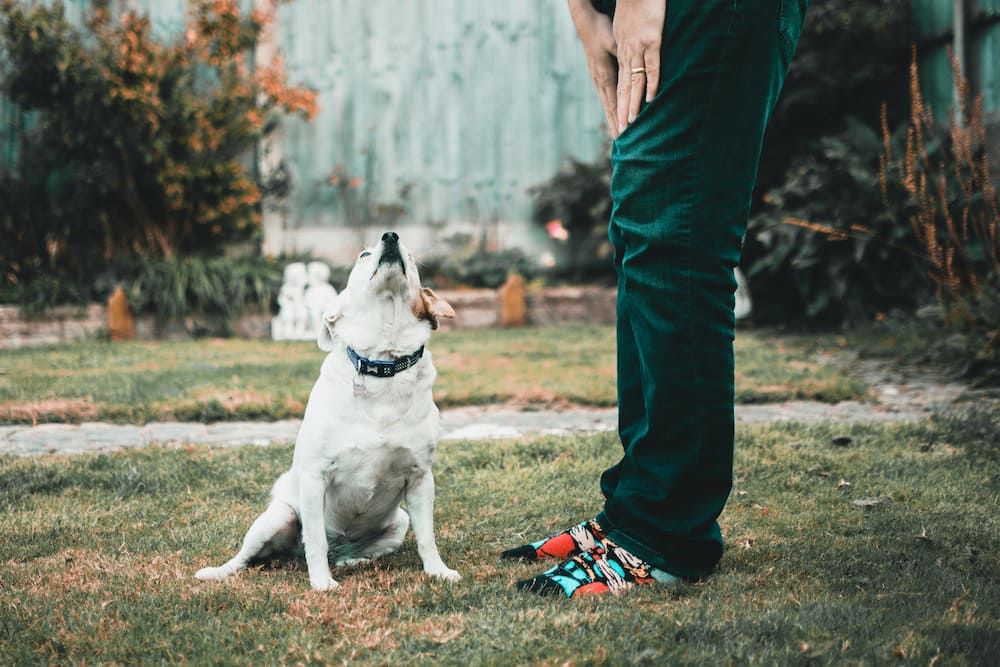

Image by Lisa Fotiosfrom Pexels
6. Having a Tedious Time
One of the reasons why your fluffy friend puts his paw on you is to gain your attention. It doesn’t have to be for any particular need, it might just be out of boredom.
You should read the room whether your pooch pal has been properly walked and whether he will need another walk soon. If you believe the reason he rests his paw on you is that he wants to go for a walk, you need to reconsider the walking schedule.
The best option would be to walk your fur child well enough. If this is not possible because you are pressed for time or usually knee-deep in work, walking your dog off lead can help give him enough exercise and stimulate his brain more.
7. Feeling the Need to Go Potty
If your pooch pal wants to tell you something, he will most likely never leave you alone. Putting his paw on you is a way of gaining your attention. For obtaining the looked-for result, your pet can also put his head on your lap and try to meet your eye.
Unless you have a talented pet that can open the back door, then you will likely find yourself letting him out to go potty. If you have toilet trained your fluffy friend successfully, he should notify you when he wants to go outside, and placing his paw on you could be a sign of this.
Is it Okay to Allow Pawing?
Though pawing during pleasant moments with your dog or petting sessions can be cute, it can quickly turn into an aggravating habit and pain in the neck. When your fur child gets used to getting what he wants every time he rests his paw on you, he will continue to use this trick given half a chance.
Nine times out of ten, when our four-legged friends use their paws to communicate, they demand our immediate attention at that moment. Allowing your pooch pal to keep it going will only open the door to other undesired behaviors.
Although we love our pooch pals very much, it is important to establish a respectful relationship on both sides. You will not tolerate a friend who tips on your shoulder every time he needs something, right? The relationship with our dogs should not be different. While they play a role in this persistent action, we should also consider whether we want this behavior to continue.
READ MORE: How to Socialize a Puppy With Other Dogs?
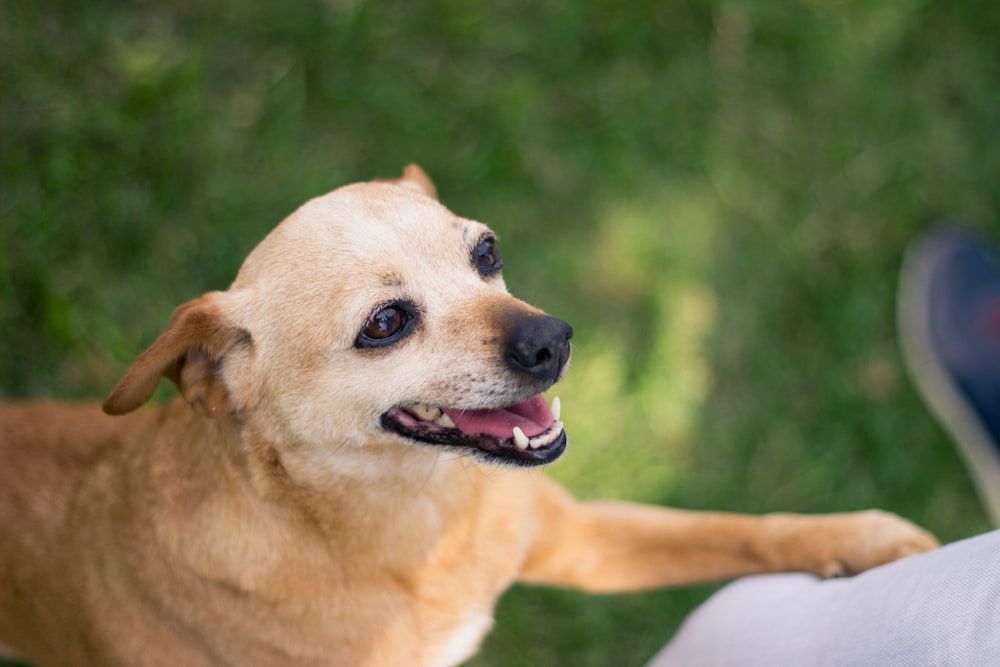

Photo by Daniel Martins on Unsplash
How to Stop Your Dog Putting His Paw on You?
However, cute pawing can seem, there are cases when we don’t want our dogs to place their paws on us – especially if we are busy with work, their paws are dirty, or we are wearing delicate fabrics. You can teach your four-legged friend that he cannot get your attention on his first demand and must wait for it. However, do not forget to give your pooch pal the attention he needs, otherwise, he may simply channel this energy into your house. High-active canines may require a lot of attention, and if you don’t provide it, your fur child will definitely find ways to get it. There are several ways to solve the problem with constant pawing without resorting to harsh methods.
- If your pup often paws you when he wants something, make sure his needs are met before you focus on your work or household chores. Does he get enough exercise and mental stimulation? Toys and indoor games can help if your pup is bored, although nothing beats a walk.
- Ignore any pawing – Ask your pup to sit when you notice that he is about to paw you. If he continues pawing, ignore him until he sits.
- Be consistent in your actions. Don’t confuse your pup. Never give attention to him when he rests his paw on you.
- When your pup sits and waits for your attention, tell him “not now” and don’t look at him until he leaves, then you can give him attention. This is an appropriate time to give a good chew toy to keep your dog busy without occupying your time.
- Gradually increase the time your pet needs to wait for your attention until he spends several hours without disturbing you. Remember to take your fluffy friend for a walk and play with him after a few hours of patience. Over time, your pooch will learn that he can show his need for attention just by sitting in front of you and that he can get what he wants by patiently waiting for it.
READ MORE: How to Stop Dog Barking at Night?
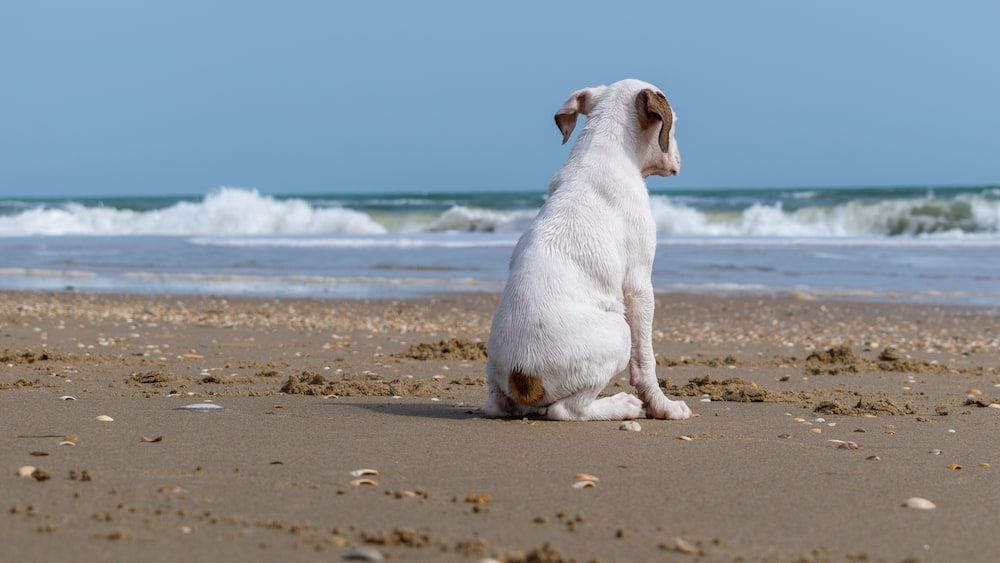

Image from Wirestock
The Bottom Line
In general, there are several reasons why pups try to communicate with us by using their paws. Though sometimes it can be cute, there are always better ways of communicating with our canine companions can use to grab our attention.
Find out your dog’s quirks and help him learn good manners to get the attention he wants!
FAQ
What does it mean when a Dog puts his Paw on you?
A pup rests his paw on you to express his thoughts and emotions. He does it to tell you he needs something, such as food, to go for a walk, show you an injury, or go potty.
Why does my Dog put his Paw on me and push?
If your four-legged friend seeks your attention, he will place his paw on you and push. It doesn’t matter to your pup whether it is good or bad attention. You can stop this behavior if you ignore his pawing.
Why does my Dog Paw at me when I stop Petting him?
Your dog may place his paw on you to convince you to give him extra love. When you stroke your pup, and he paws you, it means he wants to gain your attention and try to continue the action he likes.
Why do Dogs give you their Paw without asking?
When your furry baby paws you without asking, it means he needs your attention. Pups can be very similar to small human kids. And since your dog cannot say what he wants, he can just put his paw on you when he wants to get attention.
{"@context":"https://schema.org","@type":"FAQPage","mainEntity":[{"@type":"Question","name":"What does it mean when a Dog puts his Paw on you?","acceptedAnswer":{"@type":"Answer","text":"A pup rests his paw on you to express his thoughts and emotions. He does it to tell you he needs something, such as food, to go for a walk, show you an injury, or go potty."}},{"@type":"Question","name":"Why does my Dog put his Paw on me and push?","acceptedAnswer":{"@type":"Answer","text":"If your four-legged friend seeks your attention, he will place his paw on you and push. It doesn\u2019t matter to your pup whether it is good or bad attention. You can stop this behavior if you ignore his pawing."}},{"@type":"Question","name":"Why does my Dog Paw at me when I stop Petting him?","acceptedAnswer":{"@type":"Answer","text":"Your dog may place his paw on you to convince you to give him extra love. When you stroke your pup, and he paws you, it means he wants to gain your attention and try to continue the action he likes."}},{"@type":"Question","name":"Why do Dogs give you their Paw without asking?","acceptedAnswer":{"@type":"Answer","text":"When your furry baby paws you without asking, it means he needs your attention. Pups can be very similar to small human kids. And since your dog cannot say what he wants, he can just put his paw on you when he wants to get attention."}}]}
Article Sources:
- Hrubenja, Aleksandar. “54 Dog Statistics All Animal Lovers Should Know in 2021.” Petpedia, 13 Dec. 2020, petpedia.co/dog-statistics/.
- Siniscalchi, Marcello. “Communication in Dogs.” PubMed Central, 1 Aug. 2018, ncbi.nlm.nih.gov/pmc/articles/PMC6116041/.
- Alison Seward. “Fear of Thunderstorms and Fireworks”, https://www.vet.upenn.edu/docs/default-source/ryan/ryan-behavior-medicine/fear-of-thunderstorms-amp-fireworks-(pdf).pdf?sfvrsn=c15e17ba_2
- Gibeault, Stephanie, et al. “Dealing With Puppy Separation Anxiety.” American Kennel Club, 10 Dec. 2019, akc.org/expert-advice/training/puppy-separation-anxiety/.
- “Does Your Dog Freak out When You Leave?” The Humane Society of the United States, humanesociety.org/resources/does-your-dog-freak-out-when-you-leave.


